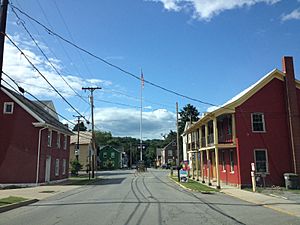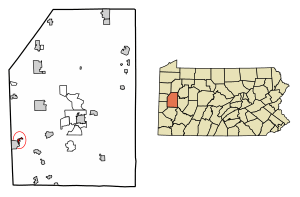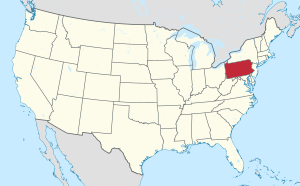Harmony, Pennsylvania facts for kids
Quick facts for kids
Harmony, Pennsylvania
|
|
|---|---|
|
Borough
|
|
| Borough of Harmony | |
 |
|

Location of Harmony in Butler County, Pennsylvania.
|
|

Location of Pennsylvania in the United States
|
|
| Country | United States |
| State | Pennsylvania |
| County | Butler County |
| Settled | 1804 |
| Incorporated | 1838 |
| Area | |
| • Total | 0.40 sq mi (1.03 km2) |
| • Land | 0.39 sq mi (1.02 km2) |
| • Water | 0.01 sq mi (0.01 km2) |
| Population
(2020)
|
|
| • Total | 942 |
| • Density | 2,390.86/sq mi (923.88/km2) |
| Time zone | UTC-5 (EST) |
| • Summer (DST) | UTC-4 (EDT) |
| Zip Code |
16037
|
| Area code(s) | 724 |
| FIPS code | 42-32688 |
| School district | Seneca Valley school district |
Harmony is a small town, called a borough, located in Butler County, Pennsylvania, United States. In 2020, about 942 people lived there. It is located about 30 miles (48 km) north of Pittsburgh.
Contents
Exploring Harmony's Location
Harmony is in the southwestern part of Butler County. It sits next to the town of Zelienople. The town is in a valley near Connoquenessing Creek, which is a river that flows into the Beaver River.
How to Get to Harmony
Interstate 79 runs just east of Harmony. You can get to the town from exits 87 and 88. If you travel south on I-79, you'll reach downtown Pittsburgh in about 30 miles (48 km). Going north for 99 miles (159 km) will take you to Erie. Pennsylvania Route 68 also goes through Harmony, just south of the main part of town. This route leads west to Zelienople and east about 17 miles (27 km) to Butler, which is the county seat.
Harmony's Size
According to the United States Census Bureau, Harmony covers a total area of 0.4 square miles (1.0 km2). A very small part of this, about 0.004 square miles (0.01 km2), is water.
Harmony's Population Over Time
| Historical population | |||
|---|---|---|---|
| Census | Pop. | %± | |
| 1850 | 441 | — | |
| 1860 | 442 | 0.2% | |
| 1870 | 414 | −6.3% | |
| 1880 | 497 | 20.0% | |
| 1890 | 585 | 17.7% | |
| 1900 | 645 | 10.3% | |
| 1910 | 673 | 4.3% | |
| 1920 | 757 | 12.5% | |
| 1930 | 780 | 3.0% | |
| 1940 | 846 | 8.5% | |
| 1950 | 912 | 7.8% | |
| 1960 | 1,142 | 25.2% | |
| 1970 | 1,207 | 5.7% | |
| 1980 | 1,334 | 10.5% | |
| 1990 | 1,054 | −21.0% | |
| 2000 | 937 | −11.1% | |
| 2010 | 890 | −5.0% | |
| 2020 | 942 | 5.8% | |
| Sources: | |||
In 2000, there were 937 people living in Harmony. The population density was about 2,468 people per square mile (953 per km2). Most residents were White (99.15%). About 23.7% of households had children under 18 living with them. The average age in Harmony was 41 years old.
Harmony's Rich History
Harmony has a fascinating past, starting long before it was officially founded.
Early Visitors and the French and Indian War
In December 1753, two famous explorers, George Washington and Christopher Gist, traveled through this area. They were near a place known as Mutheringtown, or "Murdering Town". In 2003, Harmony celebrated this event as part of the 250th Anniversary of the French and Indian War.
Founding by the Harmony Society
Harmony was founded in 1804 by a group called the Harmony Society. Their leader was George Rapp, a pietist from Württemberg, Germany. Rapp and his followers came to America in 1803. They were looking for a place where they could worship freely without being persecuted. They wanted to farm and live according to Rapp's communal religious teachings.
In 1804, the Harmonites bought land in Butler County. They officially started the Harmony Society in 1805. They lived in Pennsylvania for about 10 years.
The Harmonites' Journeys
In 1814, the Harmony Society sold their land in Harmony to Abraham Ziegler, a Mennonite. They then moved west to Indiana Territory, where they built a new town also called Harmony (now New Harmony, Indiana) on the Wabash River.
Later, in 1824, they moved back to Pennsylvania. This time, they settled in a place they named Economy (now Ambridge).
Success and Legacy of the Harmony Society
The Harmonites were very successful in their settlements. They produced many goods, including clothing, lumber, and leather. They also ran vineyards and a distillery. In Harmony, they even operated a hotel.
In Economy, the group helped build the Pittsburgh and Lake Erie Railroad. They also started a savings bank and a brick factory. The society had a big impact on the economy of western Pennsylvania. However, because the group chose to live without marrying or having children (called celibacy), their community eventually ended. The last leaders of the Harmony Society passed away in 1951.
The Mennonite Community
After the Harmonites left, a Mennonite community lived in Harmony until around 1904. An old Mennonite meeting house built in 1825 still stands on a hill near Harmony today.
Preserving Harmony's Past
Harmony's history, especially the story of the Harmony Society, is kept alive at the Harmony Museum. This museum is run by Historic Harmony, Inc.
Rapp's Seat
On a hill in Harmony, overlooking Connoquenessing Creek, there is a special rock formation known as "Rapp's Seat". People say that George Rapp used this spot to watch over his community members as they went about their daily lives. In recent years, a local Boy Scout troop built steps leading up to the seat. This was part of an Eagle Scout project by Christopher Van Arsdale.
Images for kids
-
Rapp's Seat overlooking Harmony and Connoquenessing Creek
See also
In Spanish: Harmony (Pensilvania) para niños
 | Charles R. Drew |
 | Benjamin Banneker |
 | Jane C. Wright |
 | Roger Arliner Young |



